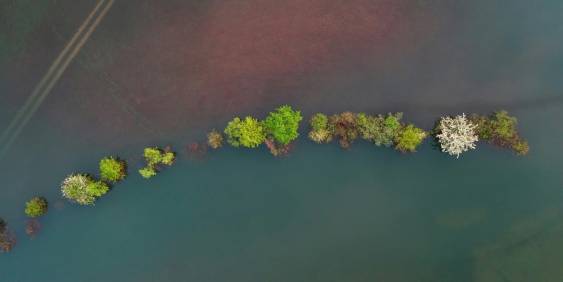
Fields of change: Governing sport for climate resilience

As climate change disrupts sport across New Zealand, boards ensure adaptation strategies do not deepen existing inequalities.
Sport is deeply embedded in the identity of Aotearoa New Zealand. It brings people together, nurtures wellbeing, and connects individuals to their communities and the environment around them.
Yet, as the impacts of climate change grow more visible and more severe, the world of sport is facing mounting disruptions: from flooded clubrooms to cancelled games, from rising costs to declining participation.
Professor Holly Thorpe, from the University of Waikato, has studied the role of sport in community recovery – from post-earthquake Christchurch and Hurricane Katrina in New Orleans, to conflict zones in Afghanistan and Palestine. In each case, she has witnessed sport’s power to help rebuild communities offering moments of joy and connection.
For the past three years, Thorpe has been living in her hometown of Gisborne studying the twin role of sport in the climate crisis: both as a sector impacted by damage, disruption and destruction, and as a source of resilience, recovery and hope.
She is leading a project focused on the health and wellbeing impacts of Cyclone Gabrielle in flood-affected Tairāwhiti, interviewing 45 young athletes from rowing, kayaking, waka ama, surfing, surf lifesaving, swimming and other sports – as well as coaches, club managers and volunteers.
Young athletes shared harrowing accounts of training in brown, sewage-contaminated rivers, debris-strewn beaches, and damaged facilities. One waka ama paddler described paddling in a river full of sewage, logs and dead animals, saying, “It’s so gross”.
A surfer described the anxiety of entering the debris-littered water, while a rower reflected on losing personal belongings and family history in the floods.
Across codes, young people expressed grief, frustration and a growing sense of disconnection from once-beloved natural environments. Many reported a drop-off in peer participation, and even the most dedicated athletes found their motivation faltering amid repeated disruptions and lost opportunities.
“Our community has been hit hard, again and again, and spirits have been down,” says Thorpe. “But with the support of coaches, parents and the wider sporting community, the young athletes I interviewed have managed to stay focused on their sporting dreams, despite so much disruption and disappointment.”
These are not isolated experiences. As Sport New Zealand – Ihi Aotearoa has outlined, climate change is already reshaping how, when and where sport takes place. Hotter temperatures, more frequent extreme weather events and rising sea levels are challenging the viability of many outdoor sports.
There is growing demand for indoor alternatives, rising maintenance costs and intensifying pressure on infrastructure. For coastal sports and regions, insurance challenges and physical damage from storms and erosion are growing concerns.
At the same time, sport contributes to the problem. High-emission travel for tournaments, energy-intensive facilities and unsustainable procurement practices all add to its environmental footprint. As Sport NZ highlights, “sport and recreation is not just a victim of climate change; it is also a net contributor”.
For governors – trustees, board members and committee members – climate change must be treated as a core strategic issue, not a peripheral one. It touches every aspect of an organisation’s mission, from participant wellbeing to financial sustainability. The risks are real – cancelled events, degraded facilities, falling participant, insurance losses, reputational harm and rising operating costs.
Effective governance requires informed, proactive leadership. Boards must build climate governance capability through literacy training, sustainability leadership, and by integrating climate into risk registers and strategic plans. Emissions reduction must become deliberate, with action across lighting, travel and supply chains offering opportunities for measurable improvements.
Equity must also be central to any response. Climate impacts disproportionately affect vulnerable groups – those in remote regions, from lower socio-economic backgrounds, or with disabilities.
In Tairāwhiti, some families faced steep costs to access gyms or transport. One parent drove hours to get their child to training after fields were waterlogged for weeks.
Thorpe found young women athletes and those with disabilities were especially impacted, with limited access to rivers, beaches and oceans for sport and recreation. Boards must ensure adaptation strategies are inclusive and do not exacerbate existing inequalities.
Sport has a powerful role to play in advocacy. It shapes culture and behaviour. Governing bodies can use their platforms to raise awareness, inspire action and lead change in the sector.
The good news is that sport is uniquely positioned to foster resilience. Community clubs often become vital hubs during disasters. After Cyclone Gabrielle, one Tairāwhiti club opened its doors for people to check in and coordinate support. A local surf club ran lessons for children from flood-affected areas, giving them respite and their parents time to clean up. Other clubs offered structure and connection amid uncertainty.
“There is so much knowledge and experience in Tairāwhiti,” says Thorpe. “Sports organisations across the country – the world even – can learn a lot from the response from our sporting community. These clubs are critical community hubs, and these formal and informal networks are more important than ever.”
Ultimately, governance is about the stewardship of people, resources, values and the future. Climate change presents both a test and an opportunity. For those around the board table, the question is no longer whether to act, but how boldly and how soon.
With the right leadership, sport can become a model of resilience and climate action moving not just with the tides, but ahead of them.



